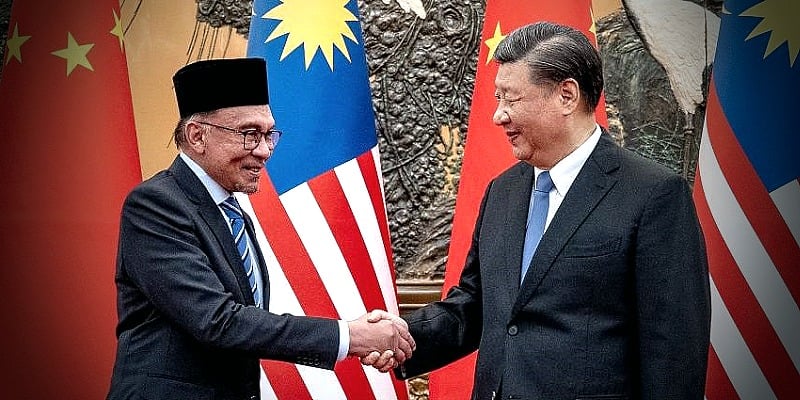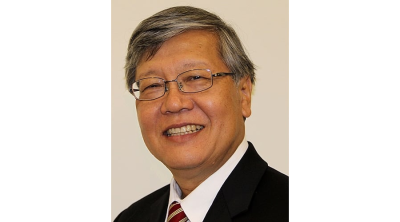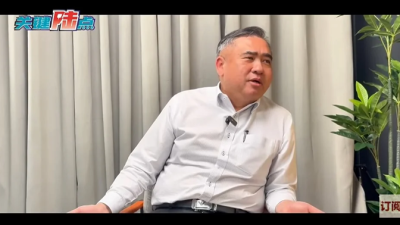
After Anwar Ibrahim’s controversial visit to Saudi Arabia, and day trip to Cambodia, his sights set upon making a successful visit to China.
The trip to China nearly didn’t go ahead, but last minute arrangements by Wisma Putra all fell into place.
Anwar went to China at a time when two other prime ministers were also there, along with the President of the European Commission Ursula von de Leyen.
President Xi Jinping had just recently returned from a visit to Moscow to meet with Russian President Vladimir Putin.
China has thrown itself into global affairs, just brokering an agreement by Saudi Arabia and Iran to re-establish diplomatic ties.
Xi’s meeting with Putin in Moscow has mapped out a new vision for a new world trade, monetary and diplomatic sphere, which will increase in importance.
In the center of this new sphere is the BRICs trade grouping, Belt and Road Initiative (BRI), and the agreement that Digital Yuan will be a means of exchange in international trade within the BRICs.
Anwar has followed on from former prime minister Najib Razak’s engagement with China.
Anwar recommitted Malaysia to the Comprehensive Strategic Partnership (CSP) with China with great enthusiasm.
Anwar also said Malaysia would re-engage the BRI in Malaysia, and expressed agreement in negotiating territorial disputes with China over the South China Sea.
This recognizes the reality of Malaysia in the region, where China has been Malaysia’s largest trading partner over the last 14 years.
Trade in 2022 was RM417.3 billion, up 15.6 percent from 2021.
Chinese investment in Malaysia is also rising, with RM2.26 billion in 2022, up 7.9 percent from 2021.
Realistically, Malaysia can only hope to solve Chinese military incursions into the Exclusive Economic Zone (EEZ) through diplomacy.
This was very much the Mahathir Mohamed approach, on the basis that Malaysia’s armed forces don’t have the capabilities to physically deal with Chinese incursions.
This has been a source of tension over the last few years, and Anwar appears to be following this pragmatic course of action with China.
In Beijing, Anwar affirmed Malaysia’s recognition of “one China” as well as bilateral cooperation along a number of issues of mutual interest, including cooperation in the proposed Global Security Initiative (GSI), Global Development Initiative (GDI), and Global Civilization Initiative (GCI), which Anwar noted was a framework that echoed the spirit of Malaysia Madani. This very much complements Asean’s approach.
RM170 billion Chinese investment?
The major takeaway from Anwar’s visit was his announcement upon return to Malaysia that Chinese firms had committed to invest RM170 billion in Malaysia, based on the 19 MOUs Anwar witnessed at a signing ceremony.
The DRB-Hicom-Zhejiang Geely project to develop the Automotive High-Tech Valley in Tanjung Malim is most likely to go ahead.
However, the other 18 MOUs at this stage are not legally binding agreements to look at the possibility of investing into Malaysia projects.
This has been hailed by Anwar as an unprecedented achievement, but trade minister Tengku Zafrul Aziz has a lot of work ahead of him to turn most of the MOUs into reality.
Anwar also had a meeting with Singapore prime minister Lee Hsien Loong on the sidelines of the Boao Forum for Asia Annual Conference 2023, where the Kuala Lumpur-Singapore high speed rail project would have most probably been discussed.
What was most apparent during Anwar’s visit to China was the focus from his business entourage on the Chinese Muslim business sector which may become a market niche Malaysia can excel.
The visit confirmed Malaysia’s tilt towards China, with expectations the Malaysia-China relationship will be a warm one during Anwar’s tenure as prime minister.
Anwar, like most other Asian leaders, bypassed US President Biden’s Summit for Democracy in Washington held just before his visit to China.
Anwar’s visit laid the groundwork for some exciting possibilities in the future, which should provide many economic and trade opportunities for Malaysia.
The first is the adoption of Digital Yuan to settle international trade transactions.
The second, although not directly mentioned, is the possibility of Malaysia becoming BRICs member one day. This would be very advantageous for the country.
Anwar has correctly coupled Malaysia to the Chinese wagon, although with most of the region. This is the best way to safeguard Malaysia’s security position and prosper with the new trade and monetary system China is developing.

(Murray Hunter has been involved in Asia-Pacific business for the last 40 years as an entrepreneur, consultant, academic and researcher. He was an associate professor at Universiti Malaysia Perlis.)
ADVERTISEMENT
ADVERTISEMENT








































